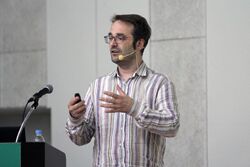Biography:Martin Bodo Plenio
Martin Bodo Plenio | |
|---|---|
 | |
| Born | 20 May 1968 (age 57) Kassel |
| Nationality | Germany |
| Alma mater | Imperial College London University of Göttingen |
| Known for | Quantum information theory Quantum technology Quantum biology |
| Awards | Maxwell Medal and Prize 2004, Clifford Paterson Lecture 2008, Alexander von Humboldt Foundation Humboldt Professor 2008, Max Born Prize 2012, ERC Synergy Grant 2012, ERC Synergy Grant 2019, Highly Cited Researcher |
| Scientific career | |
| Fields | Physics |
| Institutions | Ulm University |
| Doctoral advisor | Gerhard C. Hegerfeldt |
| Doctoral students | Fernando Brandão Vlatko Vedral |
Martin Bodo Plenio (born 20 May 1968) is a German physicist, Alexander von Humboldt Professor, and Director of the Institute for Theoretical Physics at Ulm University.
He is notable for his work on entanglement theory, quantum technology, hyperpolarisation methods and quantum biology.
Education
He obtained his Diploma 1992 and Doctorate 1994 in physics from the University of Göttingen.
Career
In 1995 – 1997, he was a Feodor Lynen Fellow at Imperial College London in the group of Prof. Sir. Peter Knight FRS. He was Lecturer (1998–2001), Senior Lecturer (2001–2003) and Full Professor (2003–2009) at Imperial College London. In 2009 he was awarded an Alexander von Humboldt Professorship[1] of the Alexander von Humboldt Foundation and moved to Ulm University where he is Director of the Institute of Theoretical Physics[2][3] and leads the Controlled Quantum Dynamics group.[4] He held a part-time position at Imperial College London.[5] He was awarded successive European Research Council Synergy in 2012 and in 2019. In 2016 he co-founded NVision Imaging Technologies [6] a technology company in the quantum technologies domain. In 2021 he co-founded QC Design [7] a technology company that is active in the field of quantum information processing technologies.
In 2014 he was awarded €27Million for a research building to establish the Center for Quantum Biosciences of which he is the founding director.[8] The center promotes research at the interface between quantum science and technology and the life sciences.
External links
References
- ↑ Alexander von Humboldt Professur 2009
- ↑ Mayer, Christoph (14 November 2008). "Zusage mit Vorbehalt". Südwest Presse. http://www.suedwest-aktiv.de/region/swp_neuulm/ulm_und_neu_ulm/3964816/artikel.php?SWAID=6066a7b921f8470b5ccf3e0aff57ab82.
- ↑ "Martin Bodo Plenio, Quantenphysiker". Focus. http://www.focus.de/wissen/mensch/tid-12137/wissenschaftspreis-martin-bodo-plenio-quantenphysiker_aid_340943.html.
- ↑ Controlled Quantum Dynamics Group, Institute of Theoretical Physics, Ulm University
- ↑ Staff Home Page Imperial College London
- ↑ [1]
- ↑ [2]
- ↑ Forschungsbau an der Universität Ulm
 |

